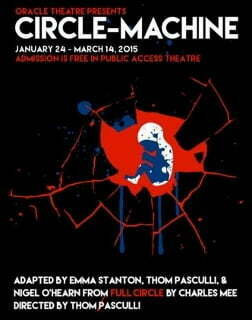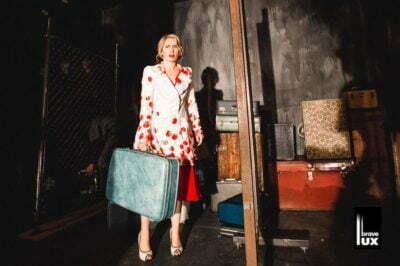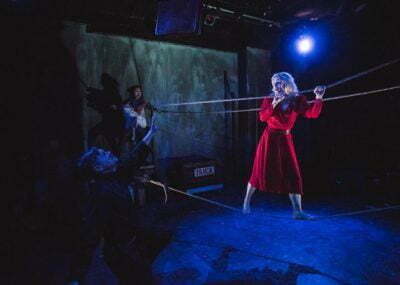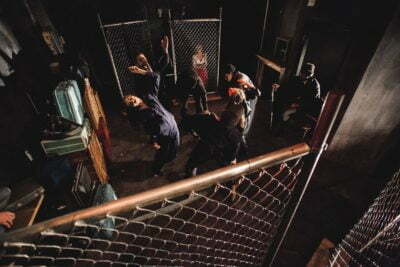Circle-Machine
Adapted by Emma Stanton, Thom Pasculli,
and Nigel O’Hearn
Based on Full Circle by Charles Mee
Directed by Thom Pasculli
Produced by Oracle Theatre
Epic Theatre Done Right
“And if I ever come back here again it will be to see you pissing yourself because you have come to the end of the line with this bullshit theatre and all your bullshit little sensitive bullshit.”—Erich Honecker
Oracle’s not afraid to be self-referential. The new play at the free theatre, Circle-Machine, is an adaptation Full Circle by Charles Mee, a writer who publishes his scripts in full online so that others may modify them to specific conditions. It, in turn, shares with Berthold Brecht’s Caucasian Chalk Circle source material from the medieval Chinese drama The Chalk Circle by Li Qianfu. But having been published in 2000, Mee’s play could not advocate for the Communist system as Brecht’s did, and instead takes place in 1989, during the brief period between the fall of the Berlin Wall and the reunification of Germany.
This show begins so seamlessly you will hardly even realize when the opening announcements end. We are watching a performance of the Berliner Ensemble, under the direction of Heiner Müller (Kevin V. Smith), and with East German dictator Erich Honecker (Ryan David Heywood) and his mistress (Simina Contras) and infant son in attendance. Müller is the writer probably best known for Hamletmachine, but today we are watching the Berliners perform Brecht’s The Mother, which was also recently put on by Oracle. Or, at least they are trying to put it on. Honecker has no patience for this weird theatre nobody understands. It really should be free, and shouldn’t get state funding, because nobody likes it. Müller assures Honecker his plays have no political content, and are therefore harmless, but Honecker is paranoid, and socialism requires a complete reworking of human character, which drama cannot do. Pamela (DeChantel Kosmatka), an American in attendance, pipes up to add the problem with Eastern European plays is the lack of human kindness.
Just then, the Berlin Wall falls, and young revolutionary Dulle Griet (Stephanie Shum) bursts in, proclaiming the end of communism. Honecker is arrested, and his mistress flees, leaving Pamela holding the baby. She enlists Dulle Greit as a babysitter, and they resolve to smuggle the baby out of the country to spare him the wrath of the new regime. Along the way, Pamela also attempts to rescue antique statues, and is consequently hounded by soldiers. Dulle Griet winds up doing most of the physical labor, and resolves she will never allow the baby to come to harm. It’s the beginning of a three-way confrontation over who the baby’s true mother is.
As Pamela, Kosmatka is idealistic, intellectual, and caring, while also unwittingly selfish and pompous. Having come to East Berlin impulsively, she becomes devoted to the baby after realizing she’s never been willing to risk her life before and has discovered something valuable in herself. Martel Manning plays her lover, Warren, who casually flits in and out of her journey with humorous results. Shum is a fiery Dulle Griet, who has finally found a positive use for all her energy. She has several poetic monologues, which she delivers with intense introspection. But the best moment in the play is a monologue by Smith as Müller, who in this adaptation takes on the role of Azdak. Consumed with self-loathing and despair, he gives an angry account of himself for his actions under the regime, as the voice of conscience who knew not to go too far. He also finally gets to defend what he has come to believe the true purpose of art is, as opposed to what he’s always had to claim before.
Part of the joy in seeing an Oracle show is how creative their design team is with such a small budget. Costume designer Joan Pritchard has given Pamela vibrant red dresses that look fancy compared to the proletarian rest of the cast. James Ogden’s scenic design is an endlessly flexible space, with the audience seated confrontationally, allowing us to observe each other along with the play. Nicholas Tonozzi and Sam Allyn have contributed music, mostly played by the actors on an accordion and a guitar, which really does bring a bit of warmth to this play’s alarming events.
Pasculi and his collaborators’ cuts to Mee’s script makes the play far more manageable and timely. Pamela and Müller’s ideas about the value of art are also an argument for the particular kind of work Oracle does, besides being an excellent example of it. The ending is very different from what Mee or Brecht had in mind. The company is true to Müller’s demand that artists use their imaginations, but they must also tell the truth, and cannot take refuge in communism’s claim to be based on or foster love, or that peoples’ nature can be changed. Circle-Machine succeeds as a dramatic story, as well as an invitation to think more deeply about the arguments it presents. In that way, it has fulfilled Brecht’s hopes even while contradicting him.
Highly Recommended
Jacob Davis
3jacob.davis@gmail.com
Reviewed January 25, 2015
For more information, see Circle-Machine’s page on Theatre in Chicago.
Playing at Oracle Theatre, 3809 North Broadway, Chicago.



